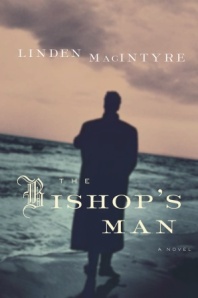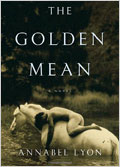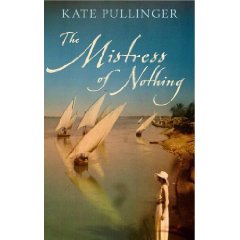Set in ancient Greece, the central story line of that novel concerns Aristotle’s role as a tutor to the youth who will become Alexander the Great — his job is to convince the headstrong son of Philip of Macedon that he needs to find the “golden mean” between action (read warring) and contemplation. That task is surrounded by unfolding global events, not the least of which is the conflict between the Macedonians and Athenians. Lyon was also true to the society of the times — a list of the cast of characters at the start of the book has 43 names, ranging from Philip and Alexander through Aristotle’s family to his extended household of servants and slaves.
![]() The Sweet Girl returns to ancient Greece, some years later (and this novel’s cast of characters has 28 names). As the book opens, things are not going well for Aristotle. His wife, Pythias, has died — he now has a concubine, Herpyllis, a former servant by whom he has had a son. Alexander (now the Great) has been away from Greece for some years fighting wars in the East — while Aristotle writes his former student frequently, he receives no response. Aristotle is now in his sixties and the physical complaints of aging are increasing. He is a Macedonian in Athens; the Athenians resent their conquerors. Philosophical rivals treat him as a man who is well past his prime; he has always been an eclectic thinker but his interests now are seen as the wandering concerns of a distracted, doddering old man.
The Sweet Girl returns to ancient Greece, some years later (and this novel’s cast of characters has 28 names). As the book opens, things are not going well for Aristotle. His wife, Pythias, has died — he now has a concubine, Herpyllis, a former servant by whom he has had a son. Alexander (now the Great) has been away from Greece for some years fighting wars in the East — while Aristotle writes his former student frequently, he receives no response. Aristotle is now in his sixties and the physical complaints of aging are increasing. He is a Macedonian in Athens; the Athenians resent their conquerors. Philosophical rivals treat him as a man who is well past his prime; he has always been an eclectic thinker but his interests now are seen as the wandering concerns of a distracted, doddering old man.
What does focus his attention is the potential of his daughter, Pytho, named after her mother Pythias. She is only seven when the book opens, but he is already teaching Pytho how to dissect a lamb — she has a collection of bones and skeletons from previous excursions into the scientific world. When we next meet her, she is eleven and her father has decided that she, rather than her younger brother Nico, should have a place at the monthly symposium meal where he gathers his academic colleagues — introducing a female, even if she is a bright child, is something that is simply not done:
In the past, I’d stand in the courtyard, quietly listening; perhaps creep to the doorway of the big room and listen from behind the curtains; then run fleet as a little doe back to the kitchen at the first quiver of that curtain. But something about tonight, about Nico giving up his place, about Daddy saying I should have been a boy, about Akakios’s kindness, and I find myself tripping with quite a clatter over a little table just outside the big room. A moment later the curtain wings aside and Daddy helps me up off the floor. Beyond, I can see all the men on their couches craning to see who it is.
“Please, Daddy,” I whisper.
Then I’m sitting in the corner that should have been Nico’s near Daddy, feet tucked up under me. The men are bemused.
“Getting eccentric in your dotage,” one of them calls to Daddy. “You want to watch that.”
But Pytho is smarter than Nico, despite the conventional wisdom that women belong in the kitchen. And Aristotle has always been contrarian — he has found a new project.
As in The Golden Mean, Lyon focuses her story on these intimate, human-based challenges. But she never loses sight of what is happening in the larger world around them. In this book, the big external event is the death of Alexander, a thousand miles away from Athens. Now the Macedonian conquerors in Athens are even more resented and perceived to be weaker. Aristotle and his family flee to the garrison town of Chalcis through rioting crowds who pitch stones at them — Pytho stands in the cart as a heroic child target to shame them to stop.
The flight is styled as a temporary retreat but Aristotle is fully aware he is unlikely to be making the return journey. Chalcis is a military town and his association with Alexander has long been forgotten by leaders there — the family is kicked out of the garrison after one night. They take up residence in a spacious, but run-down villa that Myrmex (a poor relation who showed up at the door in Athens and whom Aristotle adopted as a son) says he won gambling.
The philosopher has a farm in the area but it has been left in ruins by a combination of thefts and non-cultivation; the man of thought knows nothing about farming anyway. Tutoring Pytho, a far more receptive student than Alexander ever was, becomes his major preoccupation.
Material matters continue to get slowly worse, but the teaching revives him. He resolves to swim the nearby narrow tidal strait (diving down to observe the aquatic life midway through), but gets caught in the current. He is rescued, but catches pneumonia — and soon dies.
All of that takes place in Section I of The Sweet Girl and occupies almost exactly one half of the book. I will confess that as I started Section II I was already wondering how Lyon was going to cope without having Aristotle as the centrepiece for her narrative. The answer, for this reader at least, was not very well.
Pytho, still in her mid-teens, is now alone at the centre of the book. Aristotle has freed his concubine in his will, so she heads home and Pytho loses that support. Myrmex (whom she thinks she loves) turns out to be an unprincipled crook. In Chalcis, she is surrounded by a horde of people, both male and female, who want only to take advantage of a destitute young woman.
Most of the latter half of The Sweet Girl is a study in how to survive in the underground economy of rural ancient Greece, be it semi-legal or outright criminal. Pytho is more worldly than her father ever was, but that still means a lot of learning on the go — she is a quick student of life as well as thought, but that mainly means moving from one near-disaster to the next one.
I did wonder when I was reading that latter half if perhaps the fact that I had read and remembered The Golden Mean was the source of my problem with this novel. Aristotle so totally dominated the first novel, despite its large cast, that I found him a familiar and welcome character when I started this one — and may have been guilty of not paying as much attention to Pytho as I should have been in that first section. Whatever, she simply did not have enough substance for me to appreciate the final half as anything more than a chronicle of the trials and tribulations for an indigent, if well-born, woman in ancient Greece.
All of which suggests that not only do you not have to have read The Golden Mean to appreciate this book, it might better if you haven’t — my interest in Aristotle may have blinded me to what was happening with the young Pytho. On the other hand, I certainly found that memories of The Golden Mean were valuable in the first half of The Sweet Girl — for me, the portrayal of Aristotle’s challenges in aging was even stronger than the previous book.
I am sure a number of visitors here will have read that first novel and are looking forward to this one (it was released only two days ago). With apologies for my very ambivalent response to it, I am looking forward to comments both from those who have read The Golden Mean and those who choose to start their Annabel Lyon experience with The Sweet Girl. This may be one of those novels where the discussion is of more value than the original review. Yes, that is rather a plea for help.





 Shadow Giller juror Trevor Berrett has posted his review of Linden MacIntyre’s The Bishop’s Man — you can find
Shadow Giller juror Trevor Berrett has posted his review of Linden MacIntyre’s The Bishop’s Man — you can find  Shadow Giller juror Trevor Berrett has
Shadow Giller juror Trevor Berrett has 
 Shadow Giller juror Trevor Berrett has now passed the shortlist halfway mark. Here are the opening paragraphs (
Shadow Giller juror Trevor Berrett has now passed the shortlist halfway mark. Here are the opening paragraphs (